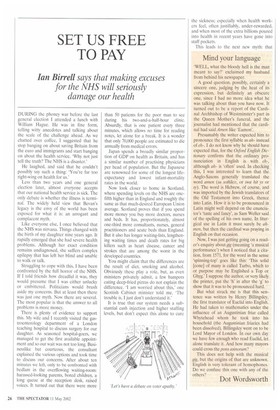Mind your language
'WELL, what the bloody hell is the man meant to say?' exclaimed my husband from behind his newspaper.
A good question, possibly, certainly a sincere one, judging by the heat of its expression, but definitely an obscure one, since I had no more idea what he was talking about than you have now. It turned out to be a report of the Cardinal Archbishop of Westminster's part in the Queen Mother's funeral, and the journalist had mentioned that the cardinal had said Amen like 'Eamon'.
Presumably the writer expected him to pronounce the first syllable as ahinstead of eh-. I do not know why he should have expected that, for the Oxford English Dictionary confirms that the ordinary pronunciation in English is with eh-, although aftis 'often' used. In checking this, I was interested to learn that the Anglo-Saxons generally translated the word amen (as sothlice, or swa hit ys or sy). The word is Hebrew, of course, and was imported by the Jewish translators of the Old Testament into Greek, thence into Latin. How it is to be pronounced in Latin might well depend on the enunciator's 'taste and fancy', as Sam Weller said of the spelling of his own name. In liturgical use in Latin it must surely be ahmen, but then the cardinal was praying in English on that occasion.
Now, I was just getting going on a reader's enquiry about gig (meaning 'a musical performance') when I noticed that a citation, from 1571, for the word in the sense 'spinning-top' goes like this: 'This solid [cone] of many is called Turbo, which to or purpose may be Englished a Top or Ghyg.' I suppose the author, or very likely the printer, put the 'h' in after the 'g' to show that it was to be pronounced hard.
But what struck me is that this sentence was written by Henry Billingsley, the first translator of Euclid into English. He had taken to mathematics under the influence of an Augustinian friar called Whytehead whom he took into his household (the Augustinian friaries had been dissolved). Billingsley went on to be Lord Mayor of London. In our own day we have few enough who read Euclid, let alone translate it. And how many mayors could cross the pons asinorum?
This does not help with the musical gig, but the origins of that are unknown. English is very tolerant of homophones. Do we confuse this one with any of the
others? Dot Wordsworth






































































 Previous page
Previous page